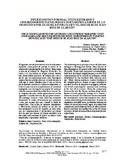Inflexiones en torno al texto literario y cinematográfico analogías y discusiones a partir de lo propuesto por Eugenia Revueltas en “el discurso de Juan Ruiz de Alarcón”.
Fecha
2024-11-05Palabras Clave
Literatura, Teatro, Cinematografía, Adaptación, CorporizaciónLiterature, Theatre, Cinematography, Adaptation, Embodiment
Metadatos
Mostrar el registro completo del ítemResumen
El siguiente artículo presenta una serie de inflexiones tomando como punto de partida
la teoría de la adaptación cinematográfica de Robert Stam como respuesta al trabajo de
Eugenia Revueltas. El teatro y el cine tienen un origen textual, ambos han
desarrollado procesos de adaptación con el fin de que sus representaciones sean
fidedignas según criterios establecidos por la tradición que a cada uno le atañe.
Mientras que el cine se vuelca por la libertad creativa en el proceso adaptativo, el
teatro es más reacio en aceptarlo pues lo considera negligente, con el riesgo de no
respetar lo canónico y dando como resultado la pérdida de su esencia. De la
comparación entre ambos generalmente resulta “ganador” el medio literario, del que
parte el teatro. Sin embargo, teóricos como Stam han intentado desmontar la visión
determinista que mantiene a éste, por encima del cine, cuando se habla de adaptación.
Con el fin de apuntar similitudes y diferencias, además de puntos en los que no
necesariamente se está de acuerdo, se hace notar que las comparaciones y refutaciones
no tienen otro fin más que abonar, de forma saludable, a la discusión sobre un tema de
interés en torno a estas importantes expresiones artísticas.
Recibido: Febrero-2024 / Aceptado: Mayo-2024
Colecciones
Información Adicional
| Otros Títulos | Inflections around the literary and cinematographic text analogies and discussions from what is proposed by Eugenia Revueltas in “the speech of Juan Ruiz de Alarcón”. |
| Correo Electrónico | earenas@uacj.mx rutiliog@gmail.com |
| ORCID | https://orcid.org/0009-0004-8020-937X https://orcid.org/0000-0003-0687-6495 |
| Editor | SaberULA |
| ISSN | 0798-1570 |
| ISSN Electrónico | 2244-8438 |
| Resumen en otro Idioma | The following article presents a series of inflections taking as a starting point Robert Stam’s theory of film adaptation as a response to the work of Eugenia Revueltas. Theater and cinema have a textual origin, both have developed adaptation processes for their representations to be reliable according to criteria established by the tradition that concerns each one. While cinema embraces creative freedom in the adaptive process, theater is more reluctant to accept it because it considers it negligent, with the risk of not respecting the canonical and resulting in the loss of its essence. From the comparison between the two, the literary medium, from which theater is based, generally emerges as a “winner.” However, theorists like Stam have tried to dismantle the deterministic vision that maintains this, above cinema, when talking about adaptation. To point out similarities and differences, in addition to points on which we do not necessarily agree, it is noted that comparisons and refutations have no other purpose than to contribute, in a healthy way, to the discussion on a topic of interest around these important artistic expressions. |
| Colación | 157-163 |
| Periodicidad | Semestral |
| Página Web | http://www.saber.ula.ve/cifranueva/ |
| País | Venezuela |
| Institución | Universidad de Los Andes |
| Sección | Revista Cifra Nueva: Artículos |






